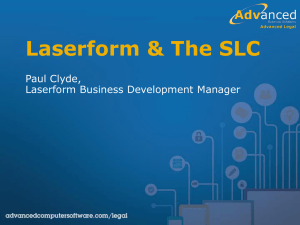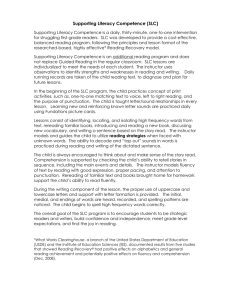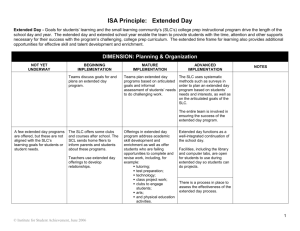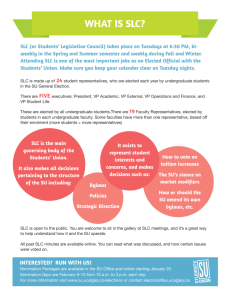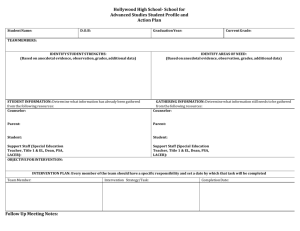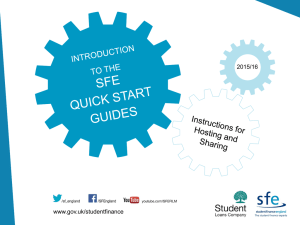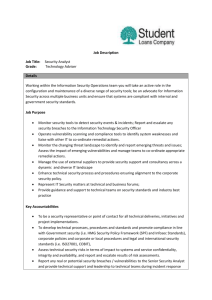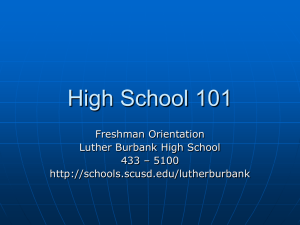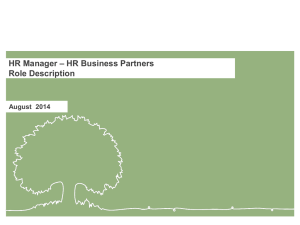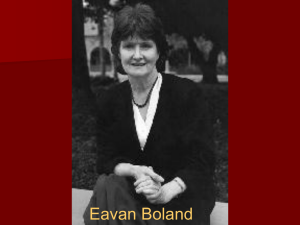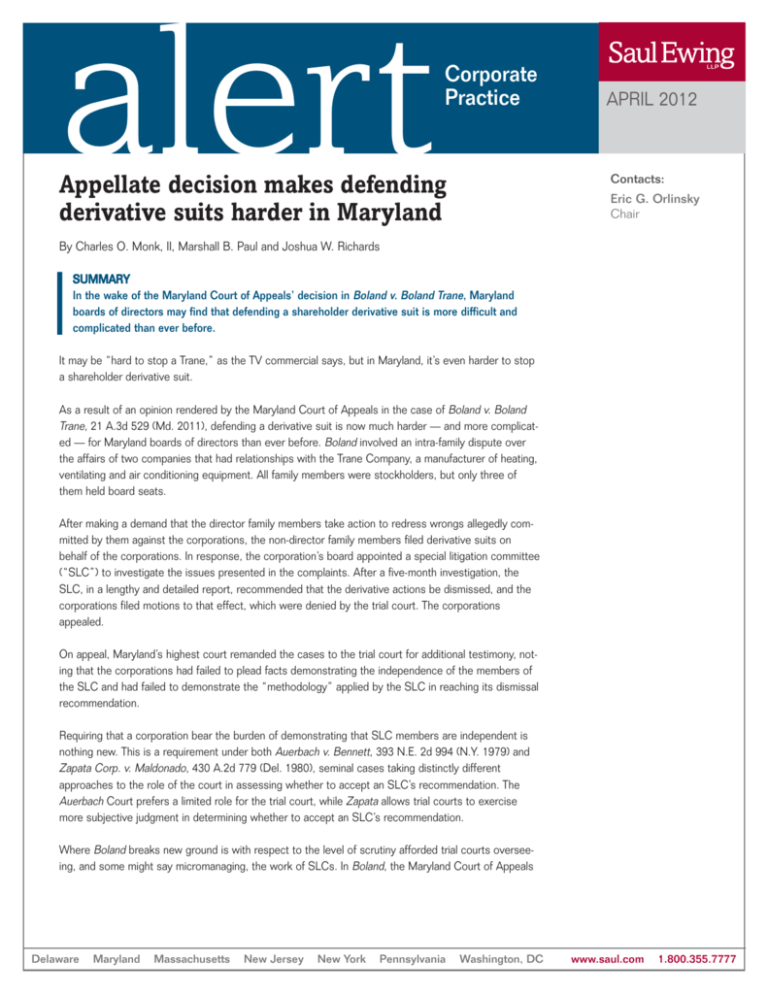
alert
Corporate
Practice
APRIL 2012
Contacts:
Appellate decision makes defending
derivative suits harder in Maryland
Eric G. Orlinsky
Chair
By Charles O. Monk, II, Marshall B. Paul and Joshua W. Richards
SUMMARY
In the wake of the Maryland Court of Appeals’ decision in Boland v. Boland Trane, Maryland
boards of directors may find that defending a shareholder derivative suit is more difficult and
complicated than ever before.
It may be “hard to stop a Trane,” as the TV commercial says, but in Maryland, it’s even harder to stop
a shareholder derivative suit.
As a result of an opinion rendered by the Maryland Court of Appeals in the case of Boland v. Boland
Trane, 21 A.3d 529 (Md. 2011), defending a derivative suit is now much harder — and more complicated — for Maryland boards of directors than ever before. Boland involved an intra-family dispute over
the affairs of two companies that had relationships with the Trane Company, a manufacturer of heating,
ventilating and air conditioning equipment. All family members were stockholders, but only three of
them held board seats.
After making a demand that the director family members take action to redress wrongs allegedly committed by them against the corporations, the non-director family members filed derivative suits on
behalf of the corporations. In response, the corporation’s board appointed a special litigation committee
(“SLC”) to investigate the issues presented in the complaints. After a five-month investigation, the
SLC, in a lengthy and detailed report, recommended that the derivative actions be dismissed, and the
corporations filed motions to that effect, which were denied by the trial court. The corporations
appealed.
On appeal, Maryland’s highest court remanded the cases to the trial court for additional testimony, noting that the corporations had failed to plead facts demonstrating the independence of the members of
the SLC and had failed to demonstrate the “methodology” applied by the SLC in reaching its dismissal
recommendation.
Requiring that a corporation bear the burden of demonstrating that SLC members are independent is
nothing new. This is a requirement under both Auerbach v. Bennett, 393 N.E. 2d 994 (N.Y. 1979) and
Zapata Corp. v. Maldonado, 430 A.2d 779 (Del. 1980), seminal cases taking distinctly different
approaches to the role of the court in assessing whether to accept an SLC’s recommendation. The
Auerbach Court prefers a limited role for the trial court, while Zapata allows trial courts to exercise
more subjective judgment in determining whether to accept an SLC’s recommendation.
Where Boland breaks new ground is with respect to the level of scrutiny afforded trial courts overseeing, and some might say micromanaging, the work of SLCs. In Boland, the Maryland Court of Appeals
Delaware
Maryland
Massachusetts
New Jersey
New York
Pennsylvania
Washington, DC
www.saul.com
1.800.355.7777
APRIL 2012
alert
directed the lower court to require that the corporation demonstrate, in explicit detail, not only the independence of the members of the SLC, but also the process used by the SLC, and
the standard of review under which the SLC analyzed the
Board’s decision. According to Boland, the SLC may not apply
a business judgment standard to the board’s decision at issue,
but rather must place itself in the shoes of the directors and
make an independent judgment based on all the facts known
by the Board. Boland, 31 A.2d at 568.
Corporate Practice
decisions of a corporation’s board of directors, we hope that
further case law will provide greater clarity for corporate directors.
If you have any questions about this emerging area of the law
in Maryland or would like further detail about the topics
addressed in this alert, please do not hesitate to contact the
authors.
More difficult to understand, however, is the requirement that
the Court’s inquiry include a detailed factual examination of the
nuts-and-bolts methodology and processes the SLC applied.
Under Boland, a court must undertake its own analysis of
whether the SLC’s methodologies were “reasonable,” and,
that analysis must be considerably more comprehensive than
courts have previously required.
Moreover, the Boland Court does not explain what “reasonableness” means in the selection and application by the SLC
of methodologies to make an independent decision. While perhaps it previously was sufficient in Maryland to demonstrate
only that the SLC did more than “rubber stamp” the board’s
decision, Boland suggests that an SLC must engage in (and
scrupulously document) a depth of analysis that, although perhaps heralded by Auerbach, appears not to have previously
been required by a high court in any jurisdiction.
The unfortunate result is that in Maryland, SLCs may have difficulty satisfying this new approach using current practices.
Because the Maryland Court of Appeals seems prepared to
treat all SLC methodologies with skepticism until proven otherwise, Boland appears to direct the trial court to place the burden squarely on the corporation to prove that an SLC’s
methodology was objectively reasonable. Moreover, the inquiry
sanctioned by the Boland opinion appears to give a defendant
no choice but to rigorously document all stages of the SLC’s
investigation, a practice that may prove to be problematic
should other litigation alleging securities fraud be lurking.
While the authors do not recommend that the Court should
endorse a rule that permits an SLC to “rubber stamp” the
This Alert was written by Charles O. Monk, II, a member of the firm’s Corporate
Governance Practice and Managing Partner of the Baltimore office, Marshall B.
Paul, a member of the firm’s Corporate Practice, and Joshua W. Richards, a
member of the firm’s Commercial Litigation Practice. Charles can be reached at
410.332.8668 or cmonk@saul.com. Marshall can be reached at 410.332.8668
or mpaul@saul.com. Joshua can be reached at 215.972.7737 or
jrichards@saul.com. This publication has been prepared by the Corporate
Practice for information purposes only.
The provision and receipt of the information in this publication (a) should not be
considered legal advice, (b) does not create a lawyer-client relationship, and (c)
should not be acted on without seeking professional counsel who have been
informed of the specific facts. Under the rules of certain jurisdictions, this communication may constitute “Attorney Advertising.”
© 2012 Saul Ewing LLP, a Delaware Limited Liability Partnership.
ALL RIGHTS RESERVED.
Baltimore, MD
Boston, MA
Chesterbrook, PA
Harrisburg, PA
Newark, NJ
New York, NY
Philadelphia, PA
Princeton, NJ
Washington, DC
Wilmington, DE
500 East Pratt St.
Charles O. Monk, II
410.332.8668
131 Dartmouth St.
Richard D. Gass
617.723.3300
1200 Liberty Ridge Dr.
Michael S. Burg
610.251.5750
2 North Second St.
Eric L. Brossman
717.257.7570
One Riverfront Plaza
Stephen B. Genzer
973.286.6712
555 Fifth Ave.,
Michael S. Gugig
212.980.7200
1500 Market St.
Bruce D. Armon
215.972.7985
750 College Rd. E
Marc A. Citron
609.452.3105
1919 Pennsylvania Ave, NW
Mark L. Gruhin
202.342.3444
Edward R. Levin
202.342.3420
222 Delaware Ave.
Wendie C. Stabler
302.421.6865
William E. Manning
302.421.6868
2.

